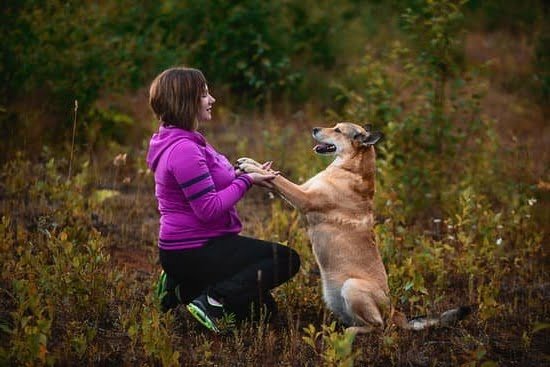What are PTSD service dogs trained to do? Post-Traumatic Stress Disorder (PTSD) service dogs are specifically trained to provide assistance and support to individuals living with PTSD. These highly trained animals play a crucial role in helping their handlers manage the symptoms of PTSD, allowing them to lead more independent and fulfilling lives.
PTSD is a mental health condition that can develop after a person experiences a traumatic event. Symptoms may include anxiety, depression, insomnia, and flashbacks, among others. For those living with PTSD, everyday tasks can become challenging, making it difficult for them to function in various aspects of their lives. This is where PTSD service dogs come in.
These remarkable animals are specially trained to assist individuals with PTSD in various ways – from providing comfort during distressing moments to offering practical assistance in navigating public spaces. The invaluable support they offer can have a profound impact on the lives of individuals struggling with this debilitating condition.
In this article, we will delve into the roles and training process of PTSD service dogs, as well as the specific tasks and skills they are trained to perform. Additionally, we will explore how these exceptional animals provide emotional support and the public access rights afforded to their handlers.
The Role of PTSD Service Dogs
PTSD service dogs play a crucial role in assisting individuals with PTSD by providing them with physical and emotional support. These specially trained dogs can help their handlers to cope with the symptoms of PTSD and improve their overall quality of life. From providing a sense of security to helping their handlers navigate through daily tasks, these service dogs are truly invaluable companions for those living with PTSD.
What are PTSD service dogs trained to do? These remarkable animals undergo extensive training to assist individuals with PTSD in various ways. One key aspect of their training is to provide grounding and interrupting anxiety or panic attacks.
They are taught to recognize signs of distress in their handlers and take action to help calm them down. Additionally, PTSD service dogs are trained to create physical boundaries around their handlers, which can help alleviate feelings of anxiety in crowded or public spaces.
Moreover, these service dogs also learn specific skills such as retrieving medication, guiding their handlers out of stressful situations, and even waking them up from nightmares. By performing these tasks, the dogs provide a sense of safety and comfort for individuals struggling with PTSD. It is important to highlight the incredible impact that these animals have on the lives of those living with this condition.
| Tasks | Skills |
|---|---|
| Interrupting anxiety or panic attacks | Recognizing signs of distress |
| Guiding their handlers out of stressful situations | Retrieving medication |
| Creating physical boundaries around their handlers | Waking them up from nightmares |
Training Process
Specialized Training Programs
PTSD service dogs undergo specialized training programs that are tailored to meet the specific needs of individuals with PTSD. These programs focus on teaching the dogs how to recognize signs of anxiety, panic attacks, or distress in their handlers and respond accordingly. They also learn how to create physical barriers between their handlers and potential triggers in crowded or public spaces.
Task-Oriented Training
During their training, PTSD service dogs are taught specific tasks such as retrieving medication, providing tactile stimulation during panic attacks, waking their handlers from nightmares, guiding them out of a stressful situation, and creating a sense of security in unfamiliar environments. Through repetitive practice and positive reinforcement, these tasks become second nature to the dogs, allowing them to provide immediate support when needed.
Behavioral Conditioning
In addition to task-oriented training, PTSD service dogs undergo behavioral conditioning to ensure they remain calm and composed in various situations. They are trained to remain focused on their handlers despite external stimuli and distractions. This conditioning helps them provide a sense of stability and assurance to individuals with PTSD who may experience heightened anxiety or hypervigilance in social settings.
The meticulous training process that PTSD service dogs undergo ensures that they are well-prepared to assist individuals with PTSD in managing their symptoms effectively. By learning how to recognize distress signals, perform specific tasks, and provide emotional support through behavioral conditioning, these remarkable animals play a vital role in improving the quality of life for their handlers.
Tasks and Skills
Alerting to Triggers
One of the most crucial tasks that PTSD service dogs are trained to do is to alert their handlers to potential triggers. These triggers could be anything from sudden loud noises, aggressive behavior, or signs of distress in the handler. The dog is trained to recognize these triggers and then provide a specific signal to warn their handler, giving them the opportunity to prepare themselves or remove themselves from the situation.
Blocking and Creating Space
Another important skill that PTSD service dogs are trained in is the ability to create physical space between their handler and others. In crowded situations or when the handler begins to feel overwhelmed, the dog can stand in front of or behind their handler to create a buffer zone. This can help alleviate anxiety and provide a sense of security for the individual with PTSD.
Nightmares and Flashbacks
Many individuals with PTSD often experience nightmares or flashbacks related to their traumatic experiences. PTSD service dogs are trained to react when their handlers begin experiencing these symptoms during sleep. They can wake up their handlers, provide comfort through physical contact, or even turn on lights if necessary.
Emotional Support
PTSD service dogs are trained to provide emotional support to individuals suffering from PTSD, helping them cope with anxiety, panic attacks, and other symptoms of the condition. These dogs are capable of recognizing signs of distress in their handlers and respond by providing comfort and reassurance. They can sense changes in their handler’s body language and behavior, and offer physical contact or pressure to help alleviate the symptoms of a PTSD episode.
In addition to their ability to provide physical comfort, PTSD service dogs are also trained to create a calming presence for their handlers. Their constant companionship can help individuals with PTSD feel safe and secure in various situations that might otherwise trigger anxiety or distress. This unwavering support can significantly improve the overall well-being of those struggling with the effects of trauma.
Furthermore, PTSD service dogs are trained to interrupt harmful behaviors or negative thought patterns exhibited by their handlers during times of distress. This intervention is crucial in helping individuals regain control over their emotions and prevent escalation of their symptoms. By redirecting attention and providing a distraction through specific tasks or cues, these dogs play a vital role in mitigating the impact of PTSD on their handlers’ daily lives.
| Emotional Support | Role |
|---|---|
| Provide physical comfort | Alleviate symptoms of PTSD episodes |
| Create a calming presence | Improve overall well-being |
| Interrupt harmful behaviors/negative thought patterns | Mitigate impact of PTSD on daily lives |
Public Access Rights
Individuals with PTSD service dogs have certain rights when it comes to accessing public spaces with their furry companions. These rights are in place to ensure that individuals with PTSD can have the necessary support and assistance from their service dogs wherever they go. Here are some of the key rights that individuals with PTSD service dogs have in public spaces:
- Access to All Public Places: Individuals with PTSD service dogs have the right to access all public places, including restaurants, hotels, stores, and other establishments. This ensures that they can go about their daily lives without any barriers or limitations.
- Travel Rights: When traveling by air, individuals with PTSD service dogs have the right to bring their animals on board with them. This includes both domestic and international flights, allowing them to have their service dog by their side for added comfort and support during travel.
- Accommodation Rights: Individuals with PTSD service dogs also have the right to find accommodation in hotels or rental properties that are pet-friendly. Landlords and hotel owners must provide reasonable accommodation for individuals with service dogs, even if their policies typically prohibit pets.
These rights are essential for individuals with PTSD as they allow them to benefit from the companionship and support of their service dog in various settings. It is important for establishments and businesses to be aware of these rights and to accommodate individuals with PTSD service dogs accordingly.
Overall, these public access rights play a crucial role in ensuring that individuals with PTSD service dogs can lead fulfilling lives without being restricted by unnecessary barriers. These rights help promote inclusivity and understanding for those who rely on the assistance of their loyal and highly trained service dogs on a daily basis.
Benefits of Having a PTSD Service Dog
Individuals with PTSD often face significant challenges in their daily lives, and having a PTSD service dog can have a profound positive impact on their overall well-being. These specially trained dogs are able to provide a wide range of support and assistance, ultimately helping their handlers to navigate through the difficulties associated with PTSD.
The benefits of having a PTSD service dog go beyond mere companionship, as these animals are trained to perform specific tasks and provide emotional support that can significantly improve the quality of life for individuals with PTSD.
Some of the key benefits of having a PTSD service dog include:
- Providing a sense of security: One of the most important roles of a PTSD service dog is to provide a sense of security and safety for their handler. These dogs are trained to create physical space around their handler in crowded or anxiety-inducing situations, providing a buffer that helps reduce feelings of stress and hypervigilance.
- Assistance with daily tasks: PTSD service dogs are trained to perform specific tasks that can help their handlers with day-to-day activities. This may include retrieving medication, reminding their handler to take medication, or even waking them from nightmares or panic attacks.
- Emotional support: Perhaps one of the most crucial roles of a PTSD service dog is providing emotional support to their handler during times of distress. These dogs are able to sense changes in their handler’s mood and behavior, offering comfort and calming presence when needed.
The positive impact of having a PTSD service dog cannot be overstated, as these animals play an essential role in supporting individuals living with the challenges of PTSD on a daily basis.
Conclusion
In conclusion, PTSD service dogs play a crucial role in providing assistance and support to individuals suffering from the debilitating effects of post-traumatic stress disorder. These specially trained dogs offer a range of tasks and skills that can greatly improve the quality of life for their handlers, helping them navigate through daily challenges and mitigating the symptoms of their condition. From offering emotional support to performing specific tasks, these service dogs are invaluable companions for those struggling with PTSD.
The training process for PTSD service dogs is thorough and meticulous, ensuring that they are equipped with the necessary skills to effectively assist their handlers. Trainers use various methods to prepare these animals for their important role, including obedience training, socialization, and task-specific instruction. As a result of this rigorous training, PTSD service dogs are able to perform a wide range of tasks that cater to the unique needs of individuals with PTSD.
The benefits of having a PTSD service dog are manifold, as these loyal companions not only provide practical assistance but also offer unwavering emotional support to their handlers. By accompanying them in public spaces and offering a sense of security and comfort, these service dogs significantly improve the overall well-being of those living with PTSD.
It is clear that what are PTSD service dogs trained to do goes beyond just performing tasks – they become indispensable partners in the journey towards healing and recovery for individuals struggling with this condition.
Frequently Asked Questions
What Task Does a PTSD Service Dog Perform?
A PTSD service dog can perform a variety of tasks to support individuals with PTSD, such as providing comfort during panic attacks, creating physical space in crowded areas, and waking their owner from nightmares.
Can I Train My Dog to Be a PTSD Service Dog?
While it is possible to train your own dog to be a PTSD service dog, it requires extensive training and socialization to ensure they are well-behaved and can perform the necessary tasks. Many people opt to work with professional trainers instead.
What Breed Makes the Best PTSD Service Dog?
There isn’t one specific breed that makes the best PTSD service dog, as different breeds have different strengths. However, breeds known for their intelligence, loyalty, and calm demeanor such as Golden Retrievers, Labrador Retrievers, and German Shepherds are often chosen for this role.

Welcome to the blog! I am a professional dog trainer and have been working with dogs for many years. In this blog, I will be discussing various topics related to dog training, including tips, tricks, and advice. I hope you find this information helpful and informative. Thanks for reading!





